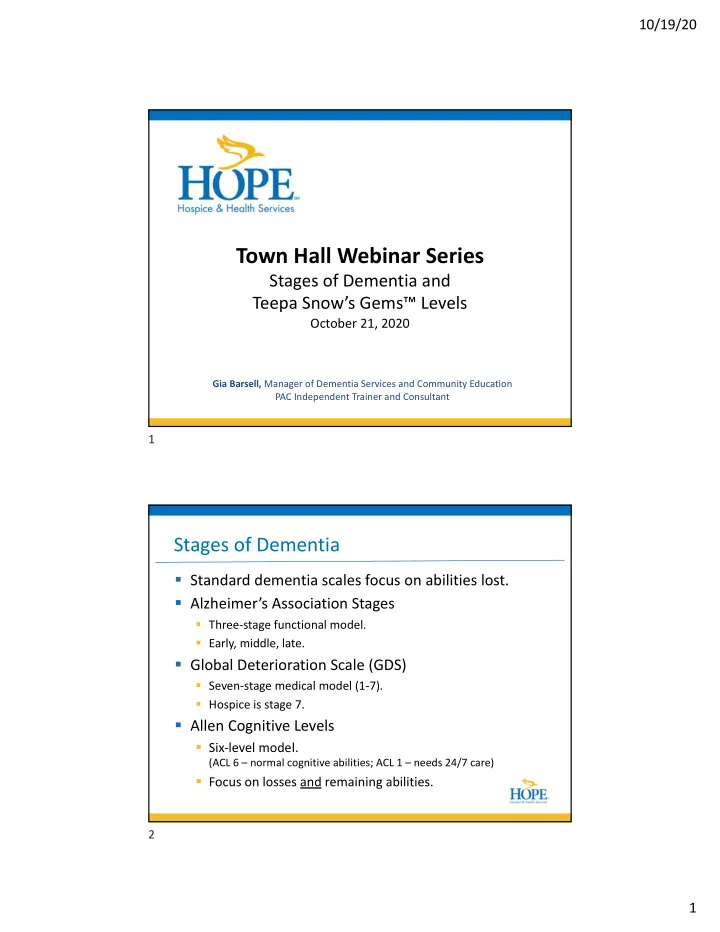

10/19/20 Town Hall Webinar Series Stages of Dementia and Teepa Snow’s Gems™ Levels October 21, 2020 Gia Barsell, Manager of Dementia Services and Community Education PAC Independent Trainer and Consultant 1 Stages of Dementia § Standard dementia scales focus on abilities lost. § Alzheimer’s Association Stages § Three-stage functional model. § Early, middle, late. § Global Deterioration Scale (GDS) § Seven-stage medical model (1-7). § Hospice is stage 7. § Allen Cognitive Levels § Six-level model. (ACL 6 – normal cognitive abilities; ACL 1 – needs 24/7 care) § Focus on losses and remaining abilities. 2 1
10/19/20 Teepa Snow’s Gems™ Levels § Focus on what remains possible. § Six gems levels: sapphire, diamond, emerald, amber, ruby, pearl. § Key Points: § Abilities are ever-changing. § Levels may fluctuate daily. § May display behaviors from more than one level. § Focus on the positive. § Note: If there is a sudden change in levels, medical team should be alerted. 3 Sapphire § True blue. § “Normal” aging – no dementia. § Slower processing, but abilities still intact. § Able to learn new things, but may require extra effort. § Care partner focus: Do not rush; stick to the tried and true; and try to minimize distractions. 4 2
10/19/20 Diamond § Many facets. § Cognition can be clear and sharp; can SHINE. § Prefers routine; may resist change. § May appear stubborn or forgetful to family; can be cutting and rigid. § May share the same stories over and over again. § Needs repetition to absorb new information. § Care partner focus: Be flexible with approaches and expectations; be attentive listeners; avoid arguing and scolding. 5 Emerald § No longer independent. § Makes mistakes; unable to fix. § Either wants to be in charge or follow lead of another. § Unaware of how much guidance is required; need to feel competent. § Increased decline in language and comprehension. § “Time-traveling.” § May begin to neglect personal care. § Care partner focus: “Choose your battles”; use visual cues and prompts; validate needs and support feelings. 6 3
10/19/20 Amber § Lives in a moment in time. § Focused on sensation. § Exploration without safety awareness. § Unable to delay gratification. § Hard to connect and spend quality time. § Care partner focus: Use their behaviors to guide your responses; join their reality; remember the senses; simplify, simplify, simplify. 7 Ruby § Big movements still possible; fine motor skills limited. § Able to copy others, but unable to understand. § Vision becomes monocular; depth perception diminished. § Unable to change gears easily. § Needs gradual (step-by-step) guidance and visual cues. § Enjoys rhythm, singing, prayer, dance. § Care partner focus: Go slowly; guide – don’t push or force; balance schedule with times for rest/relaxation and times for activities. 8 4
10/19/20 Pearl § Immobile; fetal position. § Both body and brain are failing. § Brief moments of alertness and responsiveness. § Connect through gentle touch and comfort. § Interactions must be slow and very short. § Care partner focus: Remain vigilant and close, but recognize importance of letting go when the time comes. 9 Responsive Care Partners § People living with dementia need care partners who can interpret their behaviors and determine what they want, need, and think. § Be observant to: § What they show you – how they look. § What they say – how they sound. § What they do – physical actions and reactions. § To be successful care partners we will need to let go of what was and live in the moment we are given. 10 5
Recommend
More recommend